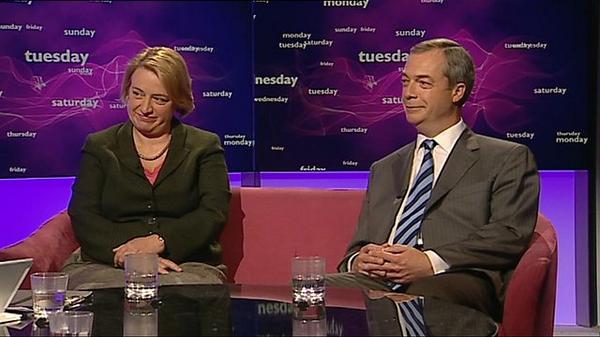7 reasons the Greens should NOT work with UKIP for electoral reform

While it may lead to increased support for electoral reform, there are a number of compelling reasons why the Green Party should avoid working directly with UKIP after the elections:
1. It’s a slippery slope and history has proven that with the best possible intentions, opportunistic alliances with far-right parties like UKIP can unleash bigger forces pushing the whole political debate in a direction that the Green Party disagrees with. By then it may be too late to extricate ourselves from the association. The phenomenon is particularly stark in Hungary, where I live and where the formerly very openly fascist party Jobbik is currently polling on 18%. The rise of Jobbik has been aided in no small way by the failure of the other parties, including the equally unpalatable governing party FIDESZ, to challenge its extremist policies, particularly among working class people. In addition, the dithering of the left-wing parties, including the Socialists and the Greens, and their willingness to work with Jobbik in certain constituencies, have done nothing for the reputation of the former and instead have strengthened the far-right populist vote. The left are seen as ineffectual and weak, while Jobbik is seen as the ones that ‘get things done’.
2. Clear-cut opposition to UKIP’s policies may gain us more political capital than a short-sighted alliance. The UK public is fed up with the ‘a bit of this and a bit of that’ attitude perfectly exemplified by the Lib Dems and is hungry for the bold and inspirational policies that the Green Party has put forward. We have accumulated a lot of good will from our members and electorates who are willing to stand behind us even if the occasional interview goes wrong. However, many would not forgive us for muddying the waters by appearing to condone UKIP, even if we made a big effort to explain that it is only to push through our joint electoral reform agenda. Public opinion thrives on unequivocal messages; it doesn’t much like confusion and is prone to severely punishing those it sees as changing direction too often – as evidenced by the dismal performance of the Lib Dems in the local and European elections.
3. The Greens are still seen as extreme and ‘too far’ to the left by some, including the police; while UKIP are seen as extreme and ‘too far’ to the right. As long as the distinction remains obvious, we can only gain from this perception, but once we start working together with UKIP, it will be all too easy for people to start seeing us as similar – and we may just become known as the ‘extremists’ alliance’ rather than two fundamentally different political programmes.
4. We are already in a highly popular and inspirational progressive alliance with SNP and Plaid Cymru, part of whose appeal is female political leadership and opposition to the sexist and bullying messaging espoused by UKIP. The alliance with SNP and Plaid is built on many similar values and our memberships understand and can get behind each other’s point of view. We need to build on the alliances we already have, and we owe it to the UK public to lead on value-based politics.
5. The Greens are not equipped to take on UKIP’s political culture and work with them in a constructive way. Perhaps one day when the Green movement is very strong we can start tackling the extreme right through dialogue and engagement. Right now, whenever our activists are in the same room, we find it difficult even to chat to each other about the weather, let alone work out complex political alliances. And at the leaders’ debate, Natalie would not even shake Nigel Farage’s hand. A process of coalition building with UKIP would throw up all the stark differences between our parties and would be messy and dangerous to party morale to say the least.
6. We just passed a motion at the Green Party conference promising not to work with the Tories – we cannot now turn around and disregard the views of our membership by agreeing to work with UKIP instead. A motion to work with UKIP is unlikely to ever pass a membership vote.
7. Sometimes the struggle is more important than the winning. I don’t say this lightly, being as we are on the eve of a historic election where every vote counts. But beyond May 2015, it will be tremendously important to make it clear to our members that we need to stand fast and build on our gains and that a big part of political activism is just to keep building our own movement, that struggle and the lessons we learn through it are their own reward. In that context, getting distracted by potentially divisive and unproductive alliances for electoral gain could be profoundly damaging and alienate a lot of the new Green Surge activists.
- This article is a response to Josiah Mortimer’s ‘5 reasons the Greens should work with UKIP for electoral reform‘.




Ukip are not the enemy. The real enemy is prejudice and intolerance and this includes intolerance towards ukip supporters. A fairer and more representative voting system is needed in this country and every person deserves to be acknowledged regardless of their political stance. I voted green but I stand with any member of Ukip who agrees with me on this because I think it is the right thing to do and not at all just for electoral gain.